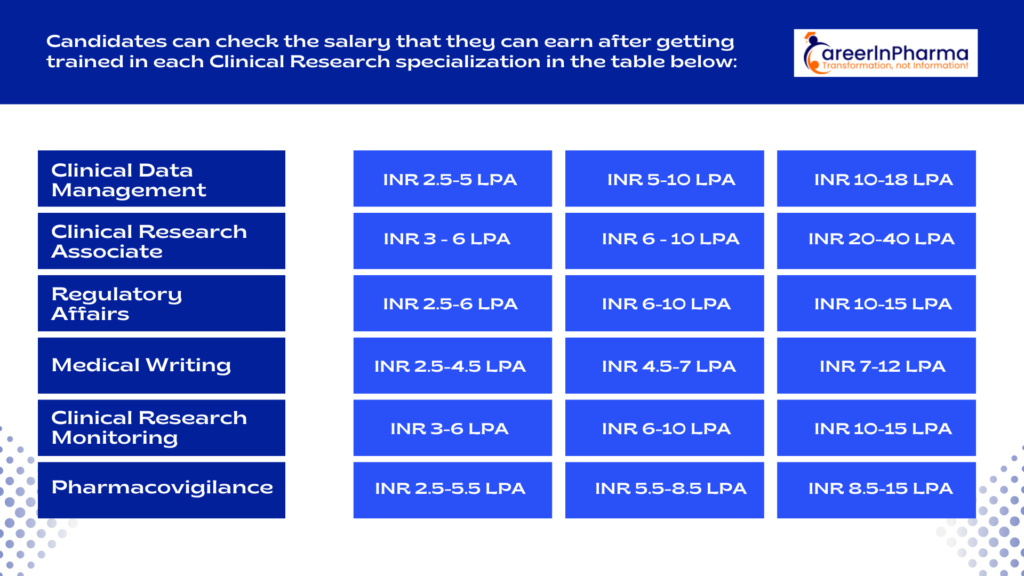
The field of clinical research is a captivating & dynamic one that offers a myriad of opportunities for individuals with a passion for science, a thirst for knowledge, and a desire to contribute to medical advancements. In this comprehensive guide, we will explore the various aspects of a career in clinical research, from medical writing to clinical research associates, dispelling myths, discussing educational pathways, and outlining prospects in India.
Clinical research scientists conduct medical investigations within laboratory settings, intending to create innovative diagnostic techniques, novel therapies, and advanced medical devices to address a diverse spectrum of diseases and ailments.
Why Choose a Career in Clinical Research?
Clinical research is the backbone of modern medicine. It is the process through which new drugs, treatments, and medical devices are rigorously tested to ensure they are safe and effective for human use. This critical phase in healthcare development offers numerous compelling reasons to consider a career in this field:
Impact on Healthcare: Clinical research professionals directly contribute to improving healthcare outcomes by helping to develop new therapies and treatments. Your work can potentially save lives and enhance the quality of life for countless individuals.
Intellectual Stimulation: The field of clinical research is intellectually challenging and constantly evolving. It requires critical thinking, problem-solving, and a commitment to staying current with the latest scientific advancements.
Diverse Opportunities: Clinical research offers a wide range of career options. Whether you’re interested in patient interactions, data analysis, regulatory affairs, or medical writing, there is a role that can align with your skills and interests.
Global Reach: Clinical research is a global endeavour. Working in this field can provide opportunities for international collaboration and the chance to contribute to research projects that have a worldwide impact.
The Path to a Career in Clinical Research
Starting a career in clinical research typically involves a combination of education, training, and practical experience. Here’s a step-by-step guide to help you get started:
1. Educational Foundation: Begin by earning a relevant bachelor’s degree. Common fields of study include biology, chemistry, pharmacology, nursing, or a related discipline degree such as MBBS, BDS, or Lifescience However, clinical research welcomes individuals from diverse educational backgrounds.
2. Gain Practical Experience: Internships or entry-level positions in research settings can provide invaluable experience. Look for opportunities to work as a Clinical Research Assistant or Research Coordinator. These roles often involve data collection, participant recruitment, and administrative support.
3. Consider a Master’s Degree: While a bachelor’s degree can open doors to entry-level positions, many professionals in clinical research pursue master’s degrees for career advancement. Programs in clinical research or related fields provide specialized knowledge and often include internships or research projects.
4. Develop Key Skills: Regardless of your educational background, certain skills are essential for success in clinical research. These include attention to detail, data analysis, communication (both written and verbal), and the ability to work as part of a multidisciplinary team.
5. Certifications: Consider obtaining certifications relevant to clinical research, such as Good Clinical Practice (GCP) or Certified Clinical Research Professional (CCRP). These certifications demonstrate your commitment to ethical research practices and can enhance your qualifications.
Diverse Career Opportunities in Clinical Research
India has emerged as a hub for clinical research, offering a plethora of opportunities for aspiring professionals. To kickstart your career in clinical research in India, you can consider enrolling in a Bachelor’s or Master’s program in clinical research or related fields. These programs provide a solid academic foundation and often include internships to gain practical experience.
One of the remarkable aspects of a career in clinical research is its diversity. There are various roles and specializations within the field. Here are some of the most common career paths.
1. Clinical Research Coordinator (CRC): CRCs play a crucial role in the day-to-day operations of clinical trials. They work closely with participants, ensure compliance with study protocols, and manage data collection.
2. Clinical Research Associate (CRA): Clinical Research Associates (CRAs) are the backbone of clinical trials. They are responsible for ensuring that research is conducted ethically, in compliance with regulations, and according to the study protocol. Clinical Research Associates work closely with investigators, site staff, and sponsors to monitor the progress of CRAs and are responsible for monitoring clinical trials conducted at research sites. They ensure that the trials are conducted following regulations and guidelines
To become a Clinical Research Associate, one typically needs a Bachelor’s degree in life sciences or a related field, along with relevant certifications. Gaining experience as a Clinical Research Coordinator or Assistant can be a stepping stone to becoming a CRA.
3. Medical Writer: Medical writing is a cornerstone of clinical research, bridging the gap between scientific research and communication. Professionals in this field play a vital role in translating complex scientific data into clear, concise, and comprehensible documents for various audiences, including researchers, regulatory agencies, and the general public. They write research papers, regulatory submissions, and patient information materials.
To embark on a career in medical writing, one should have a strong foundation in life sciences, excellent writing skills, and the ability to synthesize and present information accurately. Courses and certifications in medical writing can provide the necessary skills and knowledge to excel in this role.
4. Regulatory Affairs Specialist: These professionals are responsible for ensuring that research complies with regulatory requirements. They prepare and submit documentation to regulatory agencies and help navigate the approval process.
5. Data Analyst/Biostatistician: Data analysts and biostatisticians are responsible for collecting, analyzing, and interpreting data from clinical trials. Their work is crucial for drawing meaningful conclusions from research.
6. Clinical Research Manager/Director: These positions involve overseeing the planning and execution of clinical trials. Managers and directors are responsible for project management, budgeting, and ensuring that research aligns with organizational goals.
7. Pharmacovigilance: Pharmacovigilance refers to the science and activities associated with the operations of detection, understanding, assessment, and prevention of drugs’ adverse effects and other expected problems
8. Clinical Research Monitoring: Clinical Research monitors regulate and manage on-site visits to verify that trials are executed, documented, and reported with the utmost precision. They adhere to established regulatory guidelines and protocols, ensuring that every aspect of the trial is conducted with the highest standards of integrity and ethical consideration. Their dedicated and focused commitment to oversight plays a crucial role in maintaining the validity and credibility of clinical research, safeguarding the well-being of trial participants, and upholding the integrity of scientific inquiry
Strategies for the Future in Clinical Research
The future of clinical research is promising, evolving rapidly with advancements in technology, personalized medicine, and an increasing focus on patient-centric trials. To build a successful career in this field, individuals should stay updated with industry trends, cultivate strong networking relationships, consider specialization in areas like data science, and continuously enhance their skills.
Here are some strategies for building a bright future in clinical research:
1. Stay Informed: Keep abreast of the latest developments in healthcare, research methodologies, and regulations. Subscribe to reputable journals, attend conferences, and participate in webinars.
2. Network: Building a professional network is essential. Attend industry events, join online forums and groups, and connect with professionals in the field. Networking can lead to job opportunities and collaborations.
3. Specialize: Consider specializing in a particular area of clinical research, such as oncology, paediatrics, or rare diseases. Specialization can make you an expert in a niche field.
4. Embrace Technology: Develop proficiency in data analysis tools and technologies. Skills in data management and analysis are increasingly in demand.
5. Pursue Advanced Education: If you’re ambitious, consider pursuing a Ph.D. or advanced degree in research-related fields. Higher education can open doors to leadership positions and research roles.
6. Regulatory Knowledge: Given the complex regulatory environment in clinical research, gaining expertise in regulatory affairs can be a valuable asset.
Interested in building a future in clinical research? check out the strategies for a bright career in clinical research jobs here
Clinical Research Career Prospects in India
India’s clinical research industry is experiencing substantial growth, driven by factors like a large patient pool, cost-effectiveness, and a skilled workforce. Prospects in India range from clinical research organizations (CROs) to pharmaceutical companies, academic institutions, and regulatory agencies. The demand for professionals in roles such as Clinical Research Managers, Data Analysts, and Regulatory Affairs Specialists is on the rise.
Clinical Research Salary in India- Specialisation-Wise
India offers many career options in the field of Clinical Research to cater to different interests and career goals. These career options allow professionals to develop expertise in specific areas in the Clinical Research Field.

Myths Busted in Clinical Research Jobs
Myths about clinical research often deter potential candidates. Contrary to common misconceptions, this field is not only for medical professionals but welcomes individuals from diverse educational backgrounds. Additionally, clinical research is not limited to just drug trials; it encompasses a wide range of studies, including medical device trials and observational research.
Before diving into a career in clinical research, it’s important to debunk some common myths
Read here in details of Myths in Clinical Research Job
Conclusion
In conclusion, a career in clinical research is a rewarding journey for individuals who are passionate about improving healthcare, eager to learn and committed to ethical research practices. Whether you are interested in medical writing, becoming a Clinical Research Associate, or exploring non-clinical roles, the opportunities are vast and diverse. With the right education, skills, and determination, you can play a vital role in advancing medical science and making a positive impact on global healthcare.
A career in clinical research offers an exciting and rewarding path for individuals passionate about making a difference in healthcare. It provides opportunities to engage in cutting-edge research, contribute to medical advancements, and play a pivotal role in improving patient outcomes.
FAQs about Career In Clinical Research
1. How can I gain experience in clinical research as a fresher?
Freshers can gain experience by pursuing entry-level positions or internships in positions like Clinical Research Assistant or Research Coordinator, or by joining clinical research training programs.
2. Is clinical research only limited to drug trials?
No, It also includes observational studies, and research in various therapeutic areas like oncology, rare diseases, and pediatrics and medical device trials.

